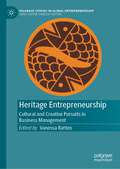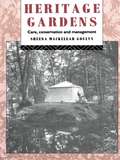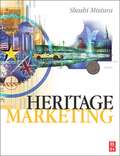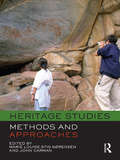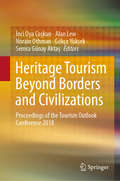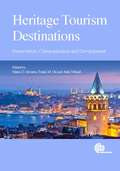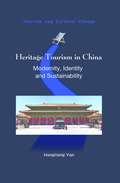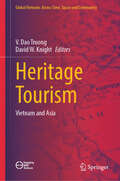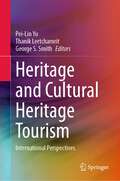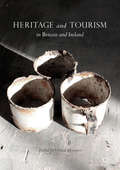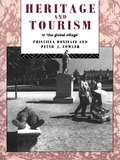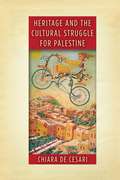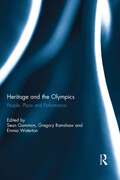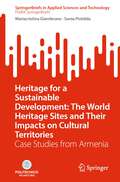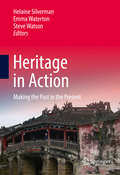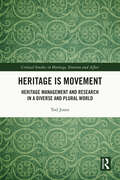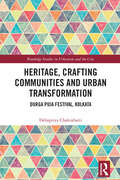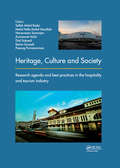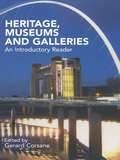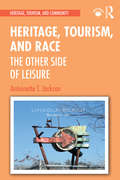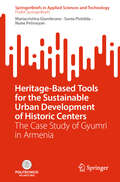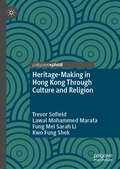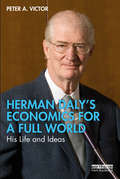- Table View
- List View
Heritage Entrepreneurship: New Perspectives On Culture, Traditions And Heritage (Contributions To Management Science Series)
by Vanessa Ratten<p>This book explores cultural and creative processes as they occur in a heritage setting, and how they can be applied to business projects. More specifically, the chapters take a detailed look at the importance of culture in entrepreneurial pursuits regarding heritage matters. This involves focusing on how culture is embedded within heritage entrepreneurship and the distinctive comparative advantages of taking a cultural approach to business. The role of entrepreneurial environments in terms of accepting creativity is highlighted, thereby making a new contribution to the study of heritage entrepreneurship. The book also elaborates on how heritage entrepreneurs are embedded in an entrepreneurial ecosystem that consists of a number of different stakeholders.<p> <p>In doing so, the book provides an interdisciplinary perspective about the ways culture, creativity and heritage combine in order to produce novel entrepreneurial contributions. It speaks to researchers, practitioners and policy makers interested in heritage entrepreneurship, enabling them to gain ideas for their work, and to move the field forward with a better understanding of heritage entrepreneurship.<p>
Heritage Gardens: Care, Conservation, Management (Heritage: Care-Preservation-Management)
by Sheena MacKellar GoultyHeritage gardens create huge management headaches. How does one preserve a garden designed for the enjoyment of the few when the advent of the many grinds it away to nothing? The answer, as presented in Heritage Gardens is a subterfuge: preserve the illusion of the created environment as originally conceived, but adjust it using more durable materials: plants and designs which require less cultivation. Of all the problems facing the heritage industry today, the managment of gardens and landscape environment create some of the greatest difficulties. This book seeks to provide some of the answers.
Heritage Marketing
by Shashi MisiuraHeritage Marketing is a new and clearly written textbook that systematically addresses the principles of marketing as applied to the heritage sector. The 'heritage industry' and its growing importance internationally is defined, as is how it links with the study of modern tourism The book then goes on to look in detail at the marketing issues that arise from the particular management, educational and cultural aspects of heritage. The book is: * A clear introduction for students and professionals * Packed with examples and cases from around the world * The most up to date and comprehensive text of its kind As heritage tourism continues to grow, so the management and marketing of heritage resources will grow more important to governments, councils and managers. This book is the ideal way for all those new to the area to understand the fundamental principles and best practice in the sector.
Heritage Studies: Methods and Approaches
by Marie Louise Stig Sørensen John CarmanThis is the first volume specifically dedicated to the consolidation and clarification of Heritage Studies as a distinct field with its own means of investigation. It presents the range of methods that can be used and illustrates their application through case studies from different parts of the world, including the UK and USA. The challenge that the collection makes explicit is that Heritage Studies must develop a stronger recognition of the scope and nature of its data and a concise yet explorative understanding of its analytical methods. The methods considered fall within three broad categories: textual/discourse analysis, methods for investigating people’s attitudes and behaviour; and methods for exploring the material qualities of heritage. The methods discussed and illustrated range from techniques such as text analysis, interviews, participant observation, to semiotic analysis of heritage sites and the use of GIS. Each paper discusses the ways in which methods used in social analysis generally are explored and adapted to the specific demands that arise when applied to the investigation of heritage in its many forms. Heritage Studies is a seminal volume that will help to define the field. The global perspective and the shared focus upon the development of reflexive methodologies ensure that the volume explores these central issues in a manner that is simultaneously case-specific and of general relevance.
Heritage Tourism Beyond Borders and Civilizations: Proceedings of the Tourism Outlook Conference 2018
by Alan Lew Norain Othman İnci Oya Coşkun Gökçe Yüksek Semra Günay AktaşThis book gathers the best papers presented at the 11th Tourism Outlook Conference, held in Eskişehir, Turkey, from 3 to 5 October 2018. Covering various aspects of heritage and its effects on tourism issues, the contributions provide a multidisciplinary perspective on emerging issues and challenges in the area. The book also analyzes both the tangible and intangible properties of natural, cultural, and historical heritage and how these relate to and influence tourism, and evaluates the importance and role of heritage in tourism destinations and products. By providing a platform for cross-disciplinary dialogues that integrate research and insights from diverse geographical, sectoral and institutional perspectives, the book allows readers to gain a better understanding of heritage tourism.
Heritage Tourism Destinations: Preservation, Communication and Development
by Atila Yüksel Maria Alvarez Frank GoHeritage tourism is tied to myth making and stories; creative content that can be shared, stored, combined and manipulated, but that depends on a unique cultural or natural history. A significant section of the wider phenomenon that is cultural tourism, heritage tourism is a demand-driven industry that continues to be a subject of heated debate in academic circles. Beginning with an overview of the subject, this book considers the conservation and revitalization of heritage destinations, as well as the role local communities have in supporting an attraction. It then discusses product development and communication around the world, using new techniques such as social media and examples from food tourism and sporting events, before a final section reviews the planning and institutionalisation of heritage spaces. A timely conclusion subsequently considers the implications of developments such as globalisation, technological improvement and climate change upon these unique destinations. A valuable addition to the literature, this book is the first to bridge the gap between theory and practice, including the latest research and international case studies for researchers and practitioners in tourism and destination management.
Heritage Tourism Destinations: Preservation, Communication and Development
by Frank M. Go Atila Yüksel Maria D. AlvarezHeritage tourism is tied to myth making and stories; creative content that can be shared, stored, combined and manipulated, but that depends on a unique cultural or natural history. A significant section of the wider phenomenon that is cultural tourism, heritage tourism is a demand-driven industry that continues to be a subject of heated debate in academic circles. Beginning with an overview of the subject, this book considers the conservation and revitalization of heritage destinations, as well as the role local communities have in supporting an attraction. It then discusses product development and communication around the world, using new techniques such as social media and examples from food tourism and sporting events, before a final section reviews the planning and institutionalisation of heritage spaces. A timely conclusion subsequently considers the implications of developments such as globalisation, technological improvement and climate change upon these unique destinations. A valuable addition to the literature, this book is the first to bridge the gap between theory and practice, including the latest research and international case studies for researchers and practitioners in tourism and destination management.
Heritage Tourism in China: Modernity, Identity and Sustainability
by Hongliang YanThis book offers new approaches and insights into the relationships between heritage tourism and notions of modernity, identity building and sustainable development in China. It demonstrates that the role of the state, politics, institutional arrangements and tradition have a considerable impact on perceptions of these notions. The volume contributes to current debates on tradition and modernity; the study of heritage tourism; the negotiated power between stakeholders in tourism planning and policy-making and the study of China’s society. The approach and findings of the book are of value to those interested in the continuities and changes in Chinese society and to graduate students and researchers in tourism, cultural studies and China studies.
Heritage Tourism: Vietnam and Asia (Global Vietnam: Across Time, Space and Community)
by V. Dao Truong David W. KnightThis book provides an overview of research and best practices associated with heritage tourism, with a particular focus on Vietnam, in conversation with heritage tourism in other Asian contexts. These include Iran in the Middle East, Sri Lanka in South Asia, Japan and China in East Asia, Thailand in Southeast Asia, and Brunei and the Philippines in the South Pacific. By delving into crucial questions and challenges relating to cultural innovation, preservation, and authenticity, it offers key lessons for policy-making and theorisation which not only contribute to understanding and improving heritage tourism in Vietnam, specifically, and in Asia more broadly, but also inform efforts to preserve and regenerate both natural and cultural heritage on a global scale. It is relevant to researchers and student communities working within areas of heritage, sustainability, tourism, geography, and in Asian studies.
Heritage and Cultural Heritage Tourism: International Perspectives
by Pei-Lin Yu George S. Smith Thanik LertcharnritThis book presents the state of the art on cultural heritage and tourism globally. Divided into four themes of historical and economic contexts; building resilient societies; de-colonization, community, and placemaking; and empowerment and social capital, the book analyses the relevance of heritage and includes case studies in sustainable cultural heritage. It offers vital context and guidance for those working in heritage management and also presents emerging cultural heritage challenges and opportunities.The volume presents a research agenda for understanding the role of heritage in identity, ecology, health and well-being and its application to heritage tourism. It discusses the need for partnerships between tourism and cultural heritage management and the need to establish better information sharing for establishing joint research initiatives. The central importance of sharing and incorporating Indigenous and/or local voices in order to expand tourists' understanding of cultural heritage runs throughout the volume. The book highlights on-the-ground tools and guidance for cultural heritage resource managers and includes a discussion on emerging and convergent challenges such as the impacts of COVID-19 and climate disasters, featuring heritage and tourism from across the globe with emphasis on the dynamic situation in East and SE Asia. A concluding chapter summarizes themes and trends and future directions for this area of research with a focus on theoretical contributions. This book is of interest to heritage scholars and practitioners.
Heritage and Tourism in Britain and Ireland
by Glenn HooperThis edited collection examines the natural, but sometimes troubled, relationship that exists between heritage and tourism. Chapters included focus on a selection of topics, including literary tourism, industrial heritage, conservation and care. Employing a range of historical and cultural materials, as well as an extensive number of case studies, the chapters offer an engaging overview of heritage and tourism developments across the Isles, especially in terms of recent policy and strategy initiatives, new facilities and infrastructure, as well as the different and evolving management systems currently in place. Interdisciplinary in scope, and drawing on the expertise of researchers from within both academia and industry, this volume will be of particular importance to those with interests in management and the humanities.
Heritage and Tourism in The Global Village (Heritage: Care-Preservation-Management)
by Priscilla Boniface Peter FowlerA nation's heritage is one of the most potent forces for generating tourism: the Tower of London is the greatest 'visitor attraction' in Britain. But it is pushed into insignificance by comparison with the visitors travelling to Disneyland, Epcot and the other entertainment complexes in the USA; and it will be dwarfed by Euro-Disneyland east of Paris. So how should heritage attractions respond: should they find their own specific audiences and resources? This book, written by a leading hertage specialist, is essential reading for all those concerned both with heritage and leisure managment. International in scope, it examines successfgul examples of heritage management for tourism, and equally some failures. It aims to lay some useful ground rules which should underpin all heritage developments designed to attract tourism on a major scale.
Heritage and the Cultural Struggle for Palestine (Stanford Studies in Middle Eastern and Islamic Societies and Cultures)
by Chiara De CesariIn recent decades, Palestinian heritage organizations have launched numerous urban regeneration and museum projects across the West Bank in response to the enduring Israeli occupation. These efforts to reclaim and assert Palestinian heritage differ significantly from the typical global cultural project: here it is people's cultural memory and living environment, rather than ancient history and archaeology, that take center stage. It is local civil society and NGOs, not state actors, who are "doing" heritage. In this context, Palestinian heritage has become not just a practice of resistance, but a resourceful mode of governing the Palestinian landscape. With this book, Chiara De Cesari examines these Palestinian heritage projects—notably the Hebron Rehabilitation Committee, Riwaq, and the Palestinian Museum—and the transnational actors, practices, and material sites they mobilize to create new institutions in the absence of a sovereign state. Through their rehabilitation of Palestinian heritage, these organizations have halted the expansion of Israeli settlements. They have also given Palestinians opportunities to rethink and transform state functions. Heritage and the Cultural Struggle for Palestine reveals how the West Bank is home to creative experimentation, insurgent agencies, and resourceful attempts to reverse colonial violence—and a model of how things could be.
Heritage and the Olympics: People, Place and Performance
by Sean Gammon, Gregory Ramshaw and Emma WatertonThe Olympic Games have evolved into the most prestigious sport event on the planet. As a consequence, each Games generates more and more interest from the academic community. Sociology, politics, geography and history have all played a part in helping to understand the meanings and implications of the Games. Heritage, too, offers invaluable insights into what we value about the Games, and what we would like to pass on to future generations. Each Olympic Games unquestionably represents key life-markers to a broad audience across the world, and the great events that take place within them become worthy of remembrance, celebration and protection. The more tangible heritage features are also evident; from the myriad artefacts and ephemera found in museums to the celebratory symbolism of past Olympic venues and sites that have become visitor attractions in their own right. This edited collection offers detailed and thought-provoking examples of these heritage components, and illustrates powerfully the breadth, passion and cultural significance that the Olympics engender.This book was published as a special issue of the International Journal of Heritage Studies.
Heritage for a Sustainable Development: Case Studies from Armenia (SpringerBriefs in Applied Sciences and Technology)
by Mariacristina Giambruno Sonia PistiddaThis book explores the potential contribution of cultural heritage in the enhancement of the territories, investigating the possibilities but also the criticalities involved in the process. Based on the knowledge process built on the Monasteries of Haghpat, Sanahin, Geghard and moreover, in the Upper Azat Valley in Armenia, the work suggests the development of an integrated design approach with interdisciplinary focus. The conservation of the Architectural Heritage of these sites is a priority for the identity safeguard but also to start virtuous processes able to ensure a sustainable development for places and communities. The objective of this work is the setting of pilot strategies and guidelines for the preservation and promotion of cultural heritage as an engine for a compatible and sustainable tourism development of the area, with tangible impact on social and economic development of the country. The work would benefit local authorities and communities, as well as researchers involved in these topics.
Heritage in Action
by Helaine Silverman Emma Waterton Steve WatsonIn this textbook we see heritage in action in indigenous and vernacular communities, in urban development and regeneration schemes, in expressions of community, in acts of nostalgia and memorialization and counteracts of forgetting, in museums and other spaces of representation, in tourism, in the offices of those making public policy, and in the politics of identity and claims toward cultural property. Whether renowned or local, tangible or intangible, the entire heritage enterprise, at whatever scale, is by now inextricably embedded in "value". The global context requires a sanguine approach to heritage in which the so-called critical stance is not just theorized in a rarefied sphere of scholarly lexical gymnastics, but practically engaged and seen to be doing things in the world.
Heritage is Movement: Heritage Management and Research in a Diverse and Plural World (Critical Studies in Heritage, Emotion and Affect)
by Tod JonesThis book presents new ways of understanding heritage and heritage work. It addresses the ways physical processes of creation, maintenance and decay are entangled with cultural and political processes of management, access and care. The book analyzes a critical practice of heritage work oriented to recognizing and collaborating with diverse knowledge holders and their practices of caring for heritage. This requires rethinking accepted heritage concepts, such as heritage management, artifact, site and the definition of heritage itself. The book presents an engaging and applied approach to this task through examples that include Majapahit statues and temples in Indonesia, skating in London, an online heritage movement, building bivouacs in Australia, First Nations advocacy for Country and batik collections in the Netherlands. Offering a new model for collaborative heritage research and analysis, this book will be of interest to researchers, students and practitioners. Drawing from developments from the posthumanities, cultural geography and critical heritage studies, it presents a collaborative mode of scholarship and writing that considers how people care for and use the things history leaves them.
Heritage, Crafting Communities and Urban Transformation: Durga Puja Festival, Kolkata (Routledge Studies in Urbanism and the City)
by Debapriya ChakrabartiThis book emphasises the need to empower marginalised communities to contribute to decision-making processes within policy realms. It contributes to ongoing debates in the social sciences about infrastructure rights and citizenship, and it throws insight on human-infrastructure interactions in the informal neighbourhoods of the global South. The book delves into the complexities of caste, gender, class, and political identities and affiliations associated with the multiple factors of inclusion and exclusion particularly in the case of access to infrastructure in informal settlements in urban areas with an added productive function. This book is about how this historic inner-city, situated, religious idol-crafting community is transforming due to factors including access to physical and social infrastructure, local governance policies, socio-political hierarchies, and complexities of informal tenure. Drawing on sociocultural norms, and values of idol-crafting practices, it documents, analyses and presents the networks and relations of the neighbourhood through a spatial and material lens. Findings contribute to understanding how traditional practices of a crafting community are adapting, appropriating, producing, and reshaping informal spaces in Kumartuli. 'The book is aimed at academic audiences across the world researching creative industries, Kolkata’s regeneration agenda, and cultural tourism. It will be of interest to the wide disciplines of Urban Studies, Development Studies, Architecture and Planning, and Culture and Tourism Studies.
Heritage, Culture and Society: Research agenda and best practices in the hospitality and tourism industry
by Salleh Mohd Radzi, Mohd Hafiz Mohd Hanafiah, Norzuwana Sumarjan, Zurinawati Mohi, Didi Sukyadi, Karim Suryadi & Pupung PurnawarmanHeritage, Culture and Society contains the papers presented at the 3rd International Hospitality and Tourism Conference (IHTC2016) & 2nd International Seminar on Tourism (ISOT 2016), Bandung, Indonesia, 10—12 October 2016). The book covers 7 themes: i) Hospitality and tourism managementii) Hospitality and tourism marketingiii) Current trends in hospitality and tourism managementiv) Technology and innovation in hospitality and tourismv) Sustainable tourismvi) Gastronomy, foodservice and food safety, and vii) Relevant areas in hospitality and tourism Heritage, Culture and Society is a significant contribution to the literature on Hospitality and Tourism, and will be of interest to professionals and academia in both areas.
Heritage, Museums and Galleries: An Introductory Reader
by Gerard CorsaneBringing the reader the very best of modern scholarship from the heritage community, this comprehensive reader outlines and explains the many diverse issues that have been identified and brought to the fore in the field of heritage, museums and galleries over the past couple of decades. The volume is divided into four parts: presents overviews and useful starting points for critical reflection focuses more specifically on selected issues of significance, looking particularly at the museum's role and responsibilities in the postmodern and postcolonial world concentrates on issues related to cultural heritage and tourism dedicated to public participation in heritage, museum and gallery processes and activities. The book provides an ideal starting point for those coming to the study of museums and galleries for the first time.
Heritage, Tourism, and Race: The Other Side of Leisure (Heritage, Tourism, and Community)
by Antoinette T JacksonHeritage, Tourism, and Race views heritage and leisure tourism in the Americas through the lens of race, and is especially concerned with redressing gaps in recognizing and critically accounting for African Americans as an underrepresented community in leisure. Fostering critical public discussions about heritage, travel, tourism, leisure, and race, Jackson addresses the underrepresentation of African American leisure experiences and links Black experiences in this area to discussions of race, place, spatial imaginaries, and issues of segregation and social control explored in the fields of geography, architecture, and the law. Most importantly, the book emphasizes the importance of shifting public dialogue from a singular focus on those groups who are disadvantaged within a system of racial hierarchy, to those actors and institutions exerting power over racialized others through practices of exclusion. Heritage, Tourism, and Race will be invaluable reading for academics and students engaged in the study of museums, as well as architecture, anthropology, public history, and a range of other disciplines. It will also be of interest to museum and heritage professionals and those studying the construction and control of space and how this affects and reveals the narratives of marginalized communities.
Heritage-Based Tools for the Sustainable Urban Development of Historic Centers: The Case Study of Gyumri in Armenia (SpringerBriefs in Applied Sciences and Technology)
by Mariacristina Giambruno Sonia Pistidda Nune PetrosyanThis book proposes a heritage-based approach for the sustainable urban development of the historic cities. The rapid growth of the cities, under the pressure of globalization processes and climate changes, implies deep transformations in their cultural asset, neglecting the role of urban heritage. Often urban planning instruments are not properly equipped with tools capable of managing the complexity of historic cities. The book fills a gap in the implementation of urban transformation, taking into consideration the urgency to protect sensitive and fragile parts of the historic city. The heritage-based tools are experimented with by using a unique case study in the Armenian context: the city of Gyumri and its historic center that, after the 1988 earthquake, suffered from a progressive degradation of its historical heritage. The book serves as a support for the implementation of the planning and regulation for the specific case study and as a methodological approach for planning the historic centers, replicable in other Armenian old cities and similar cities outside Armenia. It provides a framework for protecting the historic environment and buildings, as well as a tool for urban identity protection and a driver for economic development. The practical guidance also offers suggestions to inhabitants and technicians who must deal with the preservation of buildings and open spaces.
Heritage-Making in Hong Kong Through Culture and Religion
by Trevor Sofield Lawal Mohammed Marafa Fung Mei Li Kwo Fung ShekThis book centres on religious heritage-making where religion as a rich and diverse manifestation of culture and community empowerment lead to the transformation of place. Fusing heritage and religion in the novel multidisciplinary concept ‘heri-ligion’, the authors illuminate the dynamics of change inherent in religious-oriented heritage-making. Grounded in empirical evidence, this rich concept integrates religious tourism, heritage tourism, and community-based empowerment for sustainable development. Applying this unique concept to the once abandoned Hakka village of Yim Tin Tsai, the authors analyse the evolving paths of the island from its Hakka origins to a Christian pilgrimage site, and more recently, to a UNESCO cultural heritage site and thriving tourist destination. The authors foreground the important role of the scattered community as a key agent of change in facilitating a sustainable environment of Hong Kong’s only salt-producing place today. A dynamic example of community development and empowerment founded upon religious, cultural, industrial and natural heritage, this book uniquely contributes to tourism and heritage studies, human geography, cultural sociology, Hakka studies, Asian studies, and anthropology of religion.
Herman Daly’s Economics for a Full World: His Life and Ideas
by Peter A. VictorAs the first biography of Professor Herman Daly, this book provides an in-depth account of one of the leading thinkers and most widely read writers on economics, environment and sustainability. Herman Daly’s economics for a full world, based on his steady-state economics, has been widely acknowledged through numerous prestigious international awards and prizes. Drawing on extensive interviews with Daly and in-depth analysis of his publications and debates, Peter Victor presents a unique insight into Daly’s life from childhood to the present day, describing his intellectual development, inspirations and influence. Much of the book is devoted to a comprehensive account of Daly’s foundational contributions to ecological economics. It describes how his insights and proposals have been received by economists and non-economists and the extraordinary relevance of Daly’s full world economics to solving the economic problems of today and tomorrow. Innovative and timely, this book will be of great interest to students, scholars, researchers, activists and policy makers concerned with economics, environment and sustainability.
Herman Miller (A): Innovation by Design
by Sandra J. SucherGary Van Spronsen, president of Miller SQA, has been asked to leave the thriving subsidiary he helped to reinvent to join Herman Miller's corporate initiative on innovation. Miller SQA has pioneered processes new to the Herman Miller organization, such as computer-assisted sales and value chain integration. This case details the innovations that have led to a completely new business model for a previously underserved market and highlights the integration of target customer, product design, manufacturing, and supply chain management. Includes color exhibits.
